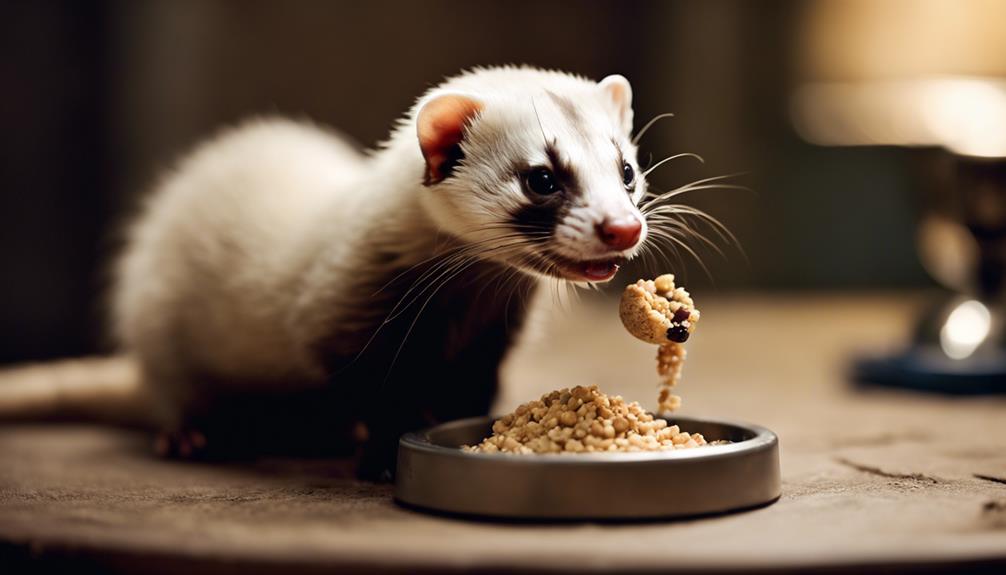How to Encourage Picky Ferrets to Eat

If your ferret is a picky eater, there are several strategies you can try to encourage them to eat.
First, offer a variety of high-quality ferret foods, including dry kibble and wet food options.
You can also try mixing in some tasty treats or a small amount of ferret-safe oils to entice them to eat.
Feeding your ferret at regular times each day can help establish a routine and encourage them to eat when food is offered.
Additionally, make sure your ferret has access to fresh water at all times and keep their feeding area clean and free of distractions.
If your ferret continues to refuse food or shows signs of illness, it's important to consult with a veterinarian to rule out any underlying health issues.
Understanding Your Ferret's Preferences
To encourage a picky ferret to eat, it's crucial to understand their individual preferences and tastes. Taste preferences play a significant role in a ferret's willingness to consume food. Ferrets, like humans, have taste buds that can detect sweet, sour, bitter, and salty flavors. Some ferrets may have a preference for sweeter foods, while others might lean towards savory options. Observing which flavors your ferret enjoys can help tailor their diet to suit their tastes.
Apart from taste preferences, texture preferences also influence a ferret's eating habits. Ferrets may prefer certain textures over others, such as crunchy or soft textures. Experimenting with different textures of food can help determine what your ferret finds most palatable. Some ferrets may enjoy biting into crunchy kibbles, while others may prefer the smooth consistency of wet food.
Understanding your ferret's taste and texture preferences can guide you in selecting food that will entice even the pickiest of eaters.
Offering a Variety of Food Options

Understanding your ferret's taste and texture preferences can lead to offering a variety of food options that cater to their specific likes and dislikes. When trying to encourage picky ferrets to eat, consider the following tips:
- Food Texture: Ferrets can be sensitive to textures, so offering a mix of wet, dry, and raw foods can help cater to their preferences. Some ferrets prefer softer textures, while others may enjoy crunchier options.
- Flavor Combinations: Experiment with different flavor combinations to entice your ferret's taste buds. Mixing protein sources like chicken, turkey, or lamb with fruits and vegetables can create a diverse and appealing meal for your pet.
- Rotating Options: Keep things interesting by rotating different food options regularly. This prevents boredom and encourages your ferret to try new foods.
- Consulting a Veterinarian: If your ferret continues to be picky despite trying various food options, consult with a veterinarian specializing in exotic pets. They can provide tailored recommendations based on your ferret's specific needs and preferences.
Establishing a Feeding Routine

Establishing a consistent feeding routine for your ferret is crucial to ensure their nutritional needs are met and to promote healthy eating habits. Feeding consistency helps regulate their digestive system and prevents picky eating behavior. Positive reinforcement through meal schedule and food rewards can also encourage your ferret to eat well. Here is an example of a feeding routine for your ferret:
| Time | Meal Type | Food |
|---|---|---|
| 8:00 am | Breakfast | High-quality ferret kibble |
| 12:00 pm | Snack | Fresh fruits or vegetables |
| 4:00 pm | Lunch | Wet ferret food |
| 8:00 pm | Dinner | Raw or cooked meat |
Incorporating Interactive Feeders

Ensuring your ferret stays engaged during mealtime can be achieved by incorporating interactive feeders to stimulate both their physical and mental abilities. Interactive feeders offer a way to make mealtime more engaging and challenging for your picky eater. Here are some ways interactive feeders can benefit your ferret:
- Playtime enrichment: Interactive feeders provide mental stimulation for your ferret, turning mealtime into a fun and interactive play session.
- Encourages natural foraging behaviors: By using interactive feeders, you encourage your ferret to exhibit its natural instincts for hunting and foraging, which can lead to behavioral changes and increased activity levels.
- Slows down eating: Interactive feeders can help slow down your ferret's eating pace, preventing them from gulping down their food too quickly and aiding in better digestion.
- Reduces boredom: By adding an element of challenge to mealtime, interactive feeders can help reduce boredom and prevent behavioral issues that may arise from lack of mental stimulation.
Adding Food Toppings for Flavor

To enhance your ferret's mealtime experience and entice picky eaters, consider adding flavorful food toppings to their meals. Ferrets, like humans, can have preferences when it comes to food. By introducing new and exciting flavors to their meals, you can stimulate their interest and encourage them to eat a more balanced diet. Below is a table with some ideas for flavorful toppings that you can add to your ferret's food:
| Flavorful Toppings | Benefits |
|---|---|
| Cooked Egg Yolk | Rich in protein |
| Salmon Oil | Omega-3 fatty acids |
| Chicken Broth | Adds moisture to food |
| Liver Powder | Nutrient-rich |
| Mashed Pumpkin | High in fiber |
These toppings not only enhance the taste of your ferret's food but also provide nutritional value. Experiment with different combinations to see what your ferret enjoys the most. Remember to introduce new foods gradually to avoid upsetting their stomach.
Monitoring Your Ferret's Eating Habits

Observing your ferret's food preferences and tracking their mealtime behavior can provide valuable insights into their eating habits.
By paying attention to which foods they enjoy and how they behave during meals, you can better understand their nutritional needs and preferences.
This monitoring process can help you tailor their diet to ensure they're getting the necessary nutrients for optimal health.
Food Preferences Observation
Monitoring your ferret's eating habits is crucial in understanding their food preferences and ensuring they receive a balanced diet. Here are some practical tips to observe their food preferences effectively:
- Taste testing: Offer small amounts of various ferret-safe foods to identify their preferred flavors.
- Flavor preferences: Note which flavors your ferret gravitates towards and incorporate them into their diet.
- Observe mealtime behavior: Pay attention to how your ferret reacts to different foods to gauge their preferences.
- Keep a food journal: Record what your ferret eats daily, including likes and dislikes, to track patterns and adjust their diet accordingly.
Mealtime Behavior Tracking
Keeping track of your ferret's mealtime behavior provides valuable insights into their eating habits and preferences. Food journaling can help you record what your ferret eats, when they eat, and how much they consume. By consistently tracking this information, patterns may emerge, allowing you to identify specific preferences or aversions.
Behavior modification techniques can be implemented based on the data gathered. Additionally, taste testing new foods and incorporating mealtime games can make the feeding experience more engaging for your ferret. These activities not only stimulate their senses but also encourage them to try different foods.
Observing and tracking your ferret's mealtime behavior is a proactive approach that can lead to a better understanding of their dietary needs and preferences.
Consulting With a Vet if Necessary

If a ferret's picky eating habits persist despite attempts to diversify its diet, consulting with a vet may be necessary to rule out any underlying health issues. A vet can conduct a thorough examination to assess the ferret's overall health and determine if there are any medical reasons contributing to its selective eating behavior. Here are some steps to consider when consulting with a vet:
- Medical Examination: The vet will perform a physical examination and may recommend additional tests to identify any underlying health problems that could be affecting the ferret's appetite.
- Dietary Assessment: The vet can provide guidance on the ferret's current diet and suggest dietary adjustments or specific foods that may help improve its eating habits.
- Nutritional Supplements: In some cases, the vet may recommend nutritional supplements to ensure the ferret is receiving all the necessary vitamins and minerals for optimal health.
- Behavioral Evaluation: The vet can also assess the ferret's behavior to determine if there are any psychological factors contributing to its picky eating and provide behavioral recommendations accordingly.
Frequently Asked Questions
Can Ferrets Be Trained to Eat Specific Types of Food?
While ferrets can exhibit picky eating habits, food training can help shape their behavior. By gradually introducing new foods and reinforcing positive eating behaviors, owners can ensure their ferrets maintain a nutritional balance that aligns with their dietary preferences.
Are There Any Common Mistakes That Ferret Owners Make When Trying to Encourage Picky Eaters?
When trying to encourage picky eaters like ferrets, owners may unintentionally overlook the importance of behavioral training and utilizing food rewards. Providing a variety of options and sticking to a consistent meal schedule can help improve their eating habits.
How Can I Tell if My Ferret Is Just Being Picky or if There Is a More Serious Underlying Health Issue?
To determine if a ferret's picky eating is due to health concerns, observe for other signs like weight loss or lethargy. Dietary restrictions can mimic picky behavior, but if no improvement occurs, a vet visit is crucial.
Are There Any Natural Supplements or Remedies That Can Help Improve a Ferret's Appetite?
Herbal remedies and nutritional supplements can be beneficial for ferret behavior. Some appetite stimulants like fish oil or vitamin B12 may help improve a ferret's appetite. It's essential to consult a veterinarian before introducing any new supplements.
Is It Normal for Ferrets to Go Through Periods of Being Picky Eaters, or Could It Be a Sign of a Larger Problem?
It's essential to monitor ferrets' eating habits for any changes. Picky eating can be normal, but persistent issues might signal underlying problems. Regular medical checkups and gradual dietary changes can help address any concerns promptly and ensure your ferret's well-being.











